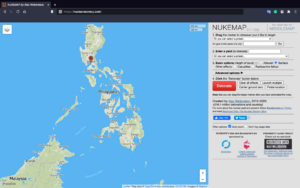Software:NUKEMAP
 Screenshot of Nukemap homepage on March 15, 2021 | |
Type of site | educational |
|---|---|
| Available in | English |
| Owner | Alex Wellerstein |
| Website | https://nuclearsecrecy.com/nukemap/ |
| Launched | 2012 |
| Current status | Active |
NUKEMAP is an interactive map using Mapbox[1] API and declassified nuclear weapons effects data, created by Alex Wellerstein, a historian of science at the Stevens Institute of Technology who studies the history of nuclear weapons. The initial version was created in February 2012, with major upgrades in July 2013,[2][3][4] which enables users to model the explosion of nuclear weapons (contemporary, historical, or of any given arbitrary yield) on virtually any terrain and at virtually any altitude of their choice.[5] A variation of the script, NUKEMAP3D, featured rough models of mushroom clouds in 3D, scaled to their appropriate sizes.[6][7] NUKEMAP3D is no longer functional as Google deprecated the Google Earth plugin.
The computer simulation of the effects of nuclear detonations has been described both as "stomach-churning" (by Wellerstein himself) and as "the most fun I’ve had with Google Maps since… well, possibly ever" despite the admittedly abjectly grim nature of the subject.[8] Originally intended in part as a pedagogical device to illustrate the stark difference in scale between fission and fusion bombs,[9] NUKEMAP went viral in 2013, necessitating a move to new servers.[6] The website averages five "nukes" per visitor.[3] Wellerstein's creation has garnered some popularity amongst nuclear strategists as an open source tool for calculating the costs of nuclear exchanges.[10] As of April 2021, more than 219 million nukes have been "dropped" on the site.
The NUKEMAP was a finalist for the National Science Foundation's Visualization Challenge in 2014.[11]
See also
External links
References
- ↑ Wellerstein, Alex (October 24, 2018). "To give numbers: to handle the 200K map loads per month that NUKEMAP gets, Google wants to charge me >$1000 a month. Even if I ran ads, that's not sustainable. It's crazy. Fortunately MapBox makes for a perfect alternative (esp. w/LeafLet), and has totally reasonable rates. (2/3)". https://twitter.com/wellerstein/status/1055172046882328584.
- ↑ "The NUKEMAPs are here | Restricted Data". 2013-07-25. http://blog.nuclearsecrecy.com/2013/07/25/the-nukemaps-are-here/.
- ↑ 3.0 3.1 Wellerstein, Alex (2012-05-04). "So Long, Mom, I'm Off to Drop the Bomb: A Case Study in Public Usage of an Educational Tool". http://wmdjunction.com/120503_nukemap_educational_tool.htm.
- ↑ "Restricted Data: The Nuclear Secrecy Blog". http://blog.nuclearsecrecy.com/.
- ↑ Jones, Brian (2013-07-16). "This Scary Interactive Map Shows What Happens If A Nuke Explodes In Your Neighborhood". http://www.businessinsider.com/nuke-map-explosion-2013-7.
- ↑ 6.0 6.1 "NukeMap 3D: Google Earth Sim Lets You Model Nuclear Strikes On Any Location". 2013-07-23. http://www.huffingtonpost.co.uk/2013/07/23/nukemap-3d-simulation-_n_3638461.html.
- ↑ "Interactive Nukemap Now In 3D - Slashdot". 2013-07-21. http://news.slashdot.org/story/13/07/21/1736217/interactive-nukemap-now-in-3d.
- ↑ Drew Bowling. "NUKEMAP Uses Google Maps API To Let You Blow Up The Outside World". http://www.webpronews.com/nukemap-uses-google-maps-api-to-let-you-blow-up-the-outside-world-2012-02.
- ↑ Terdiman, Daniel (2012-02-23). "Nukemap: Shall we play a game? | Geek Gestalt - CNET News". http://news.cnet.com/8301-13772_3-57383763-52/nukemap-shall-we-play-a-game/.
- ↑ Kroenig, Matthew (2018). The Logic of American Nuclear Strategy: Why Strategic Superiority Matters. New York City: Oxford University Press. p. 42. ISBN 9780190849191. https://books.google.com/books?id=r45HDwAAQBAJ&pg=PA42.
- ↑ "Nuclear Weapons Data Visualization Reaches Finals of National Science Foundation's "Vizzies" Award". Stevens Institute of Technology. 2014-11-11. http://www.stevens.edu/news/content/nuclear-weapons-data-visualization-reaches-finals-national-science-foundation%E2%80%99s-vizzies.

